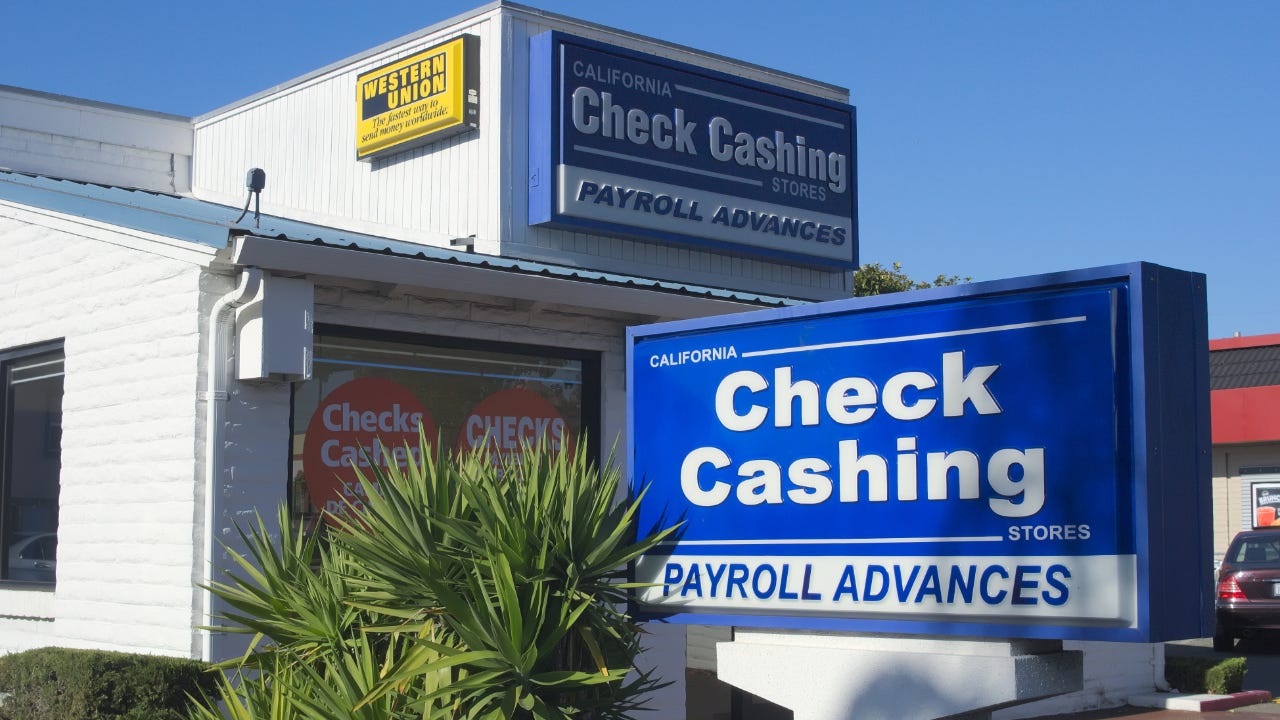What are check-cashing services?




Key takeaways
- Check-cashing services offer quick access to funds for individuals who do not have traditional bank accounts, typically through storefronts or retail locations.
- These services typically charge high fees, either as a percentage of the check amount or a flat fee, which can make them costly over time.
- They remain a popular option for unbanked and underbanked individuals who may not qualify for, or prefer not to use, a traditional bank.
Getting paid is always worth celebrating, but where do you go to turn that celebration into actual cash? About 4.2 percent of U.S. adults have to find an alternative to banks or credit unions for their banking needs, according to a recent survey from the Federal Deposit Insurance Corp. (FDIC).
This small portion of the population is often referred to as the unbanked, which means they don’t have a traditional checking or savings account. Instead, they have to explore other ways to cash their checks and turn written amounts into real dollars.
What is a check-cashing service?
While you may not be familiar with a check-cashing service, you’ve likely passed by one of these places that will happily handle your checking needs. They often have signs advertising their check-cashing ability, along with payday loans, wire transfers, money orders and other financial transactions, such as paying utility bills.
According to the trade association that represents many of these locations, Financial Service Centers of America (FISCA), there are more than 13,000 locations nationwide. Many people put a lot of money through them as well. FISCA’s data indicates that they serve more than 30 million customers each year, who are primarily from low- to moderate-income backgrounds.
How check-cashing services work
Check-cashing services provide quick access to cash without waiting for a check to clear. Instead of depositing a check at a bank and waiting for the funds to become available — which could take two to three days, depending on the bank, check amount, location relative to the check issuer and the bank’s policy — check-cashing services offer cash on the spot. Here’s how the process typically works:
- Bring your check to a check-cashing service center or a participating retailer.
- Present a valid government-issued photo identification for verification.
- The service center verifies the check and deducts any applicable fees.
- Receive your cash, usually within a few minutes.
Fee examples from some popular check-cashing options
The convenience of speed often comes with a cost, though. Check-cashing services charge a fee for each transaction. That fee will vary depending on where you cash your check and what type of check you hand over. Consider some of these check-cashing costs for cashing a paycheck.
-
Moneytree: Fees range from 1.99 percent to 3.99 percent, plus a transaction fee of $1.99 to $2.99, depending on location.
-
Amscot: Tiered system for local payroll checks, starting at $3.50 and ranging to $15.95 for a check just under $1,000; 2 percent of the amount for $1,000 or anything larger
-
PLS: 1 percent of the check amount + $1 for in-state payroll checks and government benefit checks up to $1,000; fees for other checks vary
While many locations display their fees next to the cashier window, tracking down the fees you’ll pay for cashing a check before actually going to the retail location can be tough. Also, fees are subject to change so don’t assume what you paid last time is what you will pay this time. Verify the fee first. Larger check-cashing services such as ACE Cash Express and United Check Cashing don’t readily list the fees for their services online.
If you’re looking for a potentially less confusing option, consider a local retailer that offers check cashing. Walmart Money Center, for example, charges $4 for pre-printed checks of up to $1,000; $8 for pre-printed checks above $1,000. Additional costs to consider include a $6 fee for a two-party check with a limit of $200. These fees may seem small, but if you use a check cashing service on a regular basis you are giving away a significant portion of your earnings.
Pros and cons of check-cashing services
|
Pros |
Cons |
|
Instant access to money |
High fees |
|
Useful for the unbanked |
No FDIC protection |
|
No banking relationship |
|
|
Risk of high-interest loan offers |
Pros
Instant access to money: Check-cashing services provide a quick way to access money, often within minutes. This speed can be important for people who need to pay bills or cover urgent expenses without waiting for a bank to clear their deposit.
Useful for the unbanked: “The upside of check-cashing stores is that they provide a mechanism for many consumers to work and live,” says Michael Sullivan, a personal finance consultant at Take Charge America. He adds, “Consumers can be unbanked for many reasons, from financial crime records to undocumented status. Whatever the reason, it is still often necessary for these people to cash checks, whether to pay bills or to cash tax refund and salary checks. Some seniors need to cash Social Security checks. Without commercial check cashers these consumers would have few options.”
Cons
High fees: “Some outlets will charge 10 percent or more of the value of certain checks to cash them,” Sullivan says. “If consumers are paying 10 percent of their net earnings just to get paid, that can amount to a huge decrease in their standard of living.”
No FDIC protection: Unlike traditional banks or credit unions, check-cashing services are not insured by the FDIC. That means there is no federal protection for your funds if something goes wrong.
No banking relationship: These services don’t help consumers build a relationship with a financial institution, which could provide access to savings accounts, credit products or long-term financial tools.
Risk of high-interest loan offers: “Where the law allows, many cash-checking stores are loan outlets, providing more temptation to financially distressed consumers,” Sullivan warns. Customers may walk in to cash a check but end up taking on expensive debt through payday loans or similar offers.
Should you use a check-cashing service?
Check-cashing services can be helpful in certain situations, but they are not ideal for everyone. The value often comes down to convenience and necessity, especially for those who are unbanked or facing financial constraints.
Here are a few examples of individuals who might benefit from these services:
People without access to a bank account: Whether due to financial history, documentation status or personal choice, those who cannot open a traditional account may rely on these services to access income and pay bills.
Workers paid by paper check: If your employer issues physical paychecks and you need the funds quickly, check-cashing services offer immediate access to cash. Check and see if your employer will cash your check or if they will pay you in cash. Small employers, or those in business that deal in cash, may have the ability to do so.
Individuals who need quick access to government funds: Some seniors and low-income consumers may receive benefits or refunds by check and need same-day access to cover essential expenses.
Check-cashing service alternatives
While check-cashing services offer speed and accessibility, other options may be more cost-effective and provide additional financial benefits. Here are a few alternatives worth considering:
No-fee bank account: Many banks and credit unions offer low- or no-cost checking accounts that include direct deposits, mobile check deposits and insurance from the FDIC or, for credit unions, the National Credit Union Administration (NCUA). Arranging for direct deposit is ideal because it’s the quickest and safest way to receive money, and you can usually withdraw the funds the next day.
Prepaid debit card: Some prepaid cards allow you to deposit checks through a mobile app or ATM and access your funds without visiting a check-cashing outlet. Many banks now have mobile deposit apps, so even if your employer doesn’t do direct deposit, you can deposit the check virtually from the moment you get it.
Retailers that offer check-cashing: Major retailers such as Walmart offer check-cashing services for a flat fee that is often lower than those at traditional check-cashing stores. If you work at such a retailer, you should be able to have them cash your check at no charge.
Mobile banking apps: Apps offered by banks, fintech companies or credit unions often allow you to deposit checks and access your funds electronically, sometimes on the same business day.
FAQs about check-cashing services
Bottom line
If you have faced challenges opening a traditional account at a bank or credit union, check-cashing services can help you access your money. Investigate the fees first, though. Compare different check-cashing options to find the most affordable one.
Still, there are other options if you’ve had issues in the past with banks. You could try opening a second-chance checking account, which is designed for those who’ve been rejected for a traditional bank account. Or, if you’re worried about bank fees, also consider a fee-free checking account.
Why we ask for feedback Your feedback helps us improve our content and services. It takes less than a minute to complete.
Your responses are anonymous and will only be used for improving our website.




